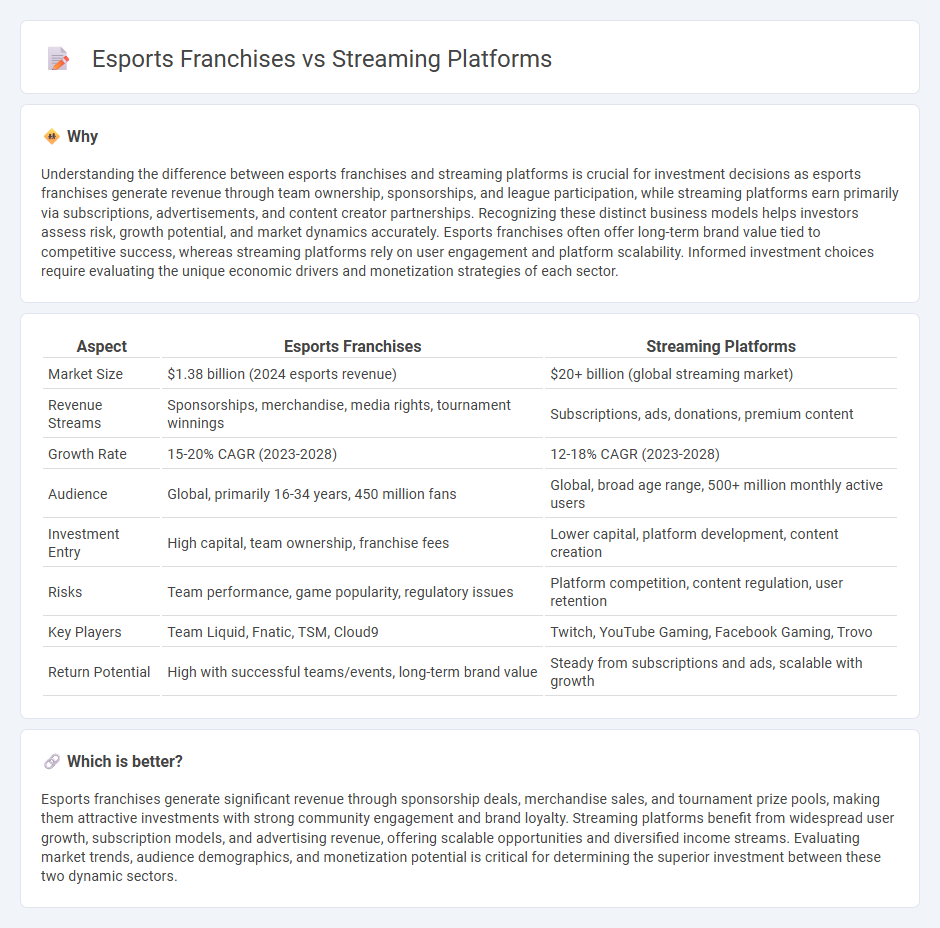
Esports franchises command significant investments through team ownership, sponsorship deals, and league participation, reflecting the competitive gaming industry's structured growth and fan engagement. Streaming platforms attract investment by monetizing vast live audiences, offering advertising revenue, subscription models, and direct viewer interaction. Discover how these distinct investment paths shape the future of digital entertainment.
Why it is important
Understanding the difference between esports franchises and streaming platforms is crucial for investment decisions as esports franchises generate revenue through team ownership, sponsorships, and league participation, while streaming platforms earn primarily via subscriptions, advertisements, and content creator partnerships. Recognizing these distinct business models helps investors assess risk, growth potential, and market dynamics accurately. Esports franchises often offer long-term brand value tied to competitive success, whereas streaming platforms rely on user engagement and platform scalability. Informed investment choices require evaluating the unique economic drivers and monetization strategies of each sector.
Comparison Table
| Aspect | Esports Franchises | Streaming Platforms |
|---|---|---|
| Market Size | $1.38 billion (2024 esports revenue) | $20+ billion (global streaming market) |
| Revenue Streams | Sponsorships, merchandise, media rights, tournament winnings | Subscriptions, ads, donations, premium content |
| Growth Rate | 15-20% CAGR (2023-2028) | 12-18% CAGR (2023-2028) |
| Audience | Global, primarily 16-34 years, 450 million fans | Global, broad age range, 500+ million monthly active users |
| Investment Entry | High capital, team ownership, franchise fees | Lower capital, platform development, content creation |
| Risks | Team performance, game popularity, regulatory issues | Platform competition, content regulation, user retention |
| Key Players | Team Liquid, Fnatic, TSM, Cloud9 | Twitch, YouTube Gaming, Facebook Gaming, Trovo |
| Return Potential | High with successful teams/events, long-term brand value | Steady from subscriptions and ads, scalable with growth |
Which is better?
Esports franchises generate significant revenue through sponsorship deals, merchandise sales, and tournament prize pools, making them attractive investments with strong community engagement and brand loyalty. Streaming platforms benefit from widespread user growth, subscription models, and advertising revenue, offering scalable opportunities and diversified income streams. Evaluating market trends, audience demographics, and monetization potential is critical for determining the superior investment between these two dynamic sectors.
Connection
Esports franchises rely heavily on streaming platforms to reach global audiences, drive fan engagement, and generate revenue through advertising and subscriptions. Streaming platforms like Twitch, YouTube Gaming, and Facebook Gaming host live esports tournaments, providing visibility and sponsorship opportunities for franchises. This symbiotic relationship enhances brand value for franchises while expanding user base and content diversity for platforms, making esports a lucrative investment sector.
Key Terms
Revenue Models
Streaming platforms generate revenue primarily through subscriptions, ads, and donations, leveraging user engagement and viewership metrics. Esports franchises rely on sponsorships, merchandise sales, tournament winnings, and media rights to build diverse income streams. Explore detailed analyses to understand how each model drives financial growth in the competitive gaming industry.
Audience Engagement
Streaming platforms leverage interactive chat features and real-time viewer analytics to enhance audience engagement, creating personalized experiences for millions of users worldwide. Esports franchises cultivate loyalty through exclusive content, team-branded merchandise, and live event collaborations that foster community connection and sustained fan interest. Discover how these strategies shape the future of digital entertainment and fan interaction.
Intellectual Property Rights
Streaming platforms maintain control over user-generated content through licensing agreements and content ID systems that protect Intellectual Property Rights (IPR). Esports franchises aggressively secure trademarks, copyrights, and broadcasting rights to safeguard their brand identity and monetize exclusive game content. Explore the complexities of IPR in esports and streaming to better understand the evolving landscape.
Source and External Links
Complete A-Z List of 50+ Streaming Services in 2025 - SmartMove - Comprehensive list of major streaming platforms including Amazon Prime Video, Netflix, Disney+, HBO Max, Hulu + Live TV, Paramount+, Peacock TV, and others, with descriptions of features and content.
List of streaming media services - Wikipedia - Extensive list of active livestreaming and on-demand streaming services such as Netflix, Spotify, YouTube, Disney+, Twitch, and many global platforms.
Stream Movies & Find Shows On The Best Streaming Services | Plex - Plex offers a free, ad-supported streaming app providing movies, TV shows, and music without subscription fees, available on numerous devices worldwide.
 dowidth.com
dowidth.com